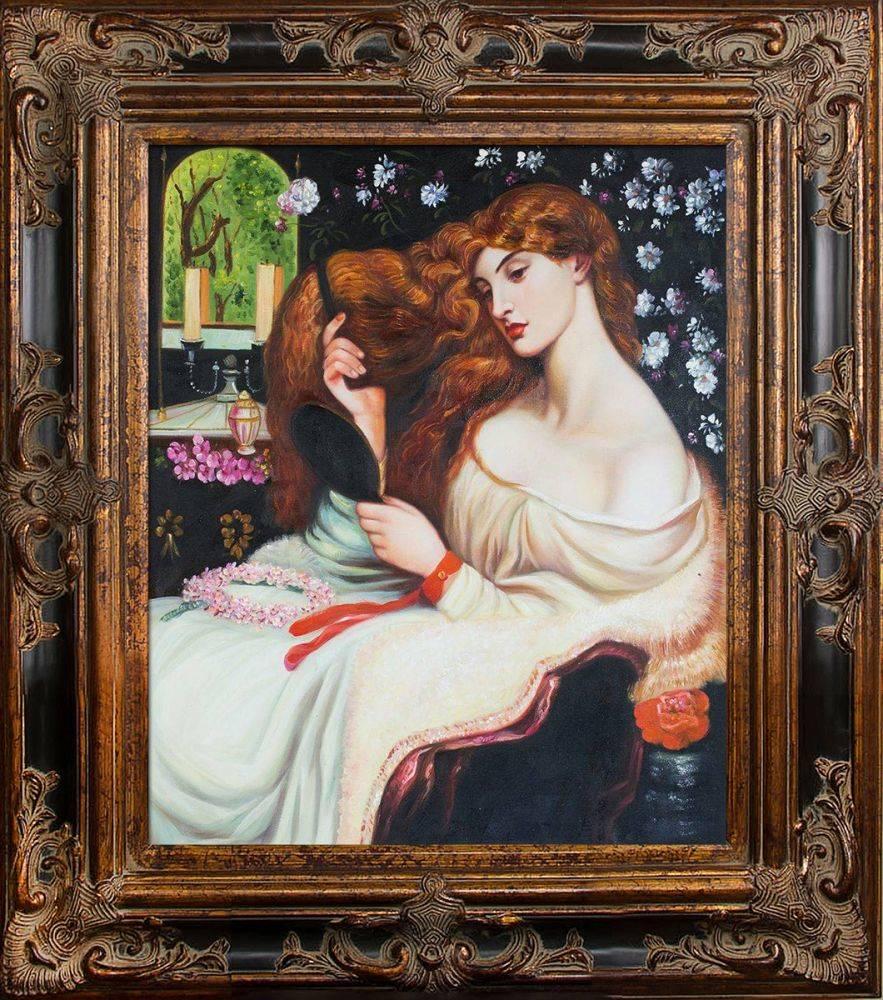
Lady Lilith PreFramed, Dante Rossetti PreFramed Oil Painting Reproduction
Brotherhood [2018] Directed by: Meryam Joobeur. Written by: Meryam Joobeur. Produced by: Maria Gracia Turgeon, Habib Attia. Mohamed is deeply shaken when his oldest son Malik returns home after a long journey with a mysterious new wife. Watch now. 'Lady Lilith' was created in 1867 by Dante Gabriel Rossetti in Romanticism style.

Dante Gabriel Rossetti Lady Lilith Dante Gabriel Rossetti, Pre Raphaelite Paintings, Pre
Lady Lilith is an oil painting by Dante Gabriel Rossetti first painted in 1866-1868 using his mistress Fanny Cornforth as the model, then altered in 1872-73 to show the face of Alexa Wilding. The subject is Lilith, who was, according to ancient Judaic myth, "the first wife of Adam" and is associated with the seduction of men and the murder of children.

Lady Lilith, Dante Gabriel Rossetti Projecto Adamastor
This is Dante Gabriel Rossetti's Pre-Raphaelite vision of Lady Lilith, Adam's wife before Eve and a symbol of malevolence and vanity. Painted in 1867 Rossetti used his lover Fanny Cornforth initially for the face of Lilith but later in 1872-3 changed the face to that of Alexa Wilding. This picture was a companion piece to Rossetti's Sibyl.
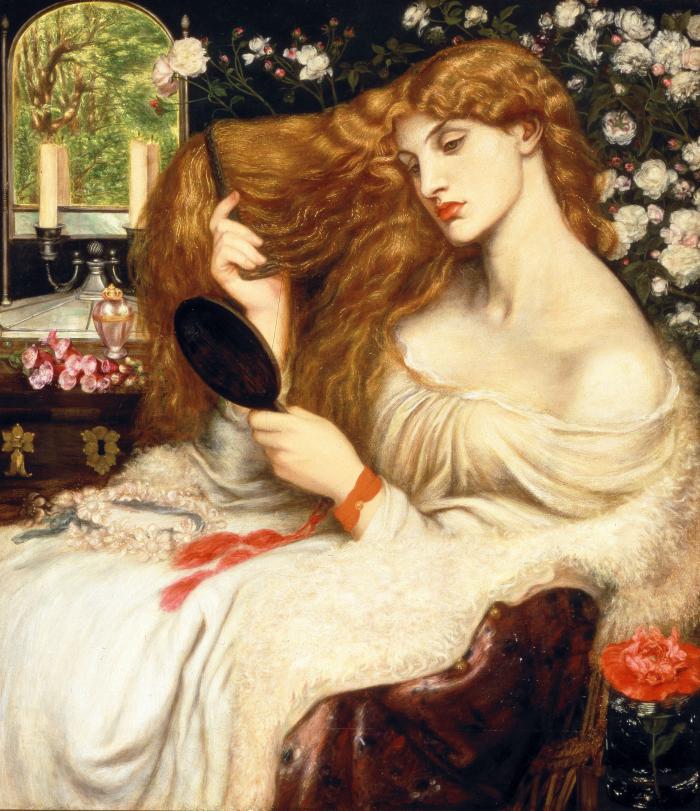
Dante Gabriel Rossetti, Lady Lilith (painting), 1868 COVE
By Dante Gabriel Rossetti. (For a Picture) Lady Lilith by Dante Gabriel Rossetti, Public Domain, Metropolitan Museum of Art. Of Adam's first wife, Lilith, it is told. (The witch he loved before the gift of Eve,) That, ere the snake's, her sweet tongue could deceive, And her enchanted hair was the first gold. And still she sits, young while.

Dante Gabriel Rossetti, Lady Lilith a photo on Flickriver
Rossetti, first painted Lady Lilith in 1866-1868 using Fanny Cornforth. However, in 1865 he met Alexa Wilding, who according to Rossetti brought out all the characteristic features of Lady Lilith. Rossetti described Alice's beauty as more refined and able to express both virtue and vice evocative of the actual subject-Lady Lilith.

Lady Lilith by Dante Gabriel Rossetti Fine Art Print 770 Etsy Canada
Rossetti's Lady Lilith of 1867 originally bore a label admonishing the young male viewer not to be ensnared by the beauty of the Faustian enchantress, but the figure, with her revealing dress, languid posture, and long red hair, is rendered with a sensuality that subverts the label's warning.

Lady Lilith by Dante Gabriel Rossetti Paintings art prints, Dante gabriel rossetti, Painting
Fascinated by women's physical allure, Rossetti here imagines a legendary femme fatale as a self-absorbed nineteenth-century beauty who combs her hair and seductively exposes her shoulders. Nearby flowers symbolize different kinds of love. In Jewish literature, the enchantress Lilith is described as Adam's first wife, and her character is underscored by lines from Goethe's Faust attached.
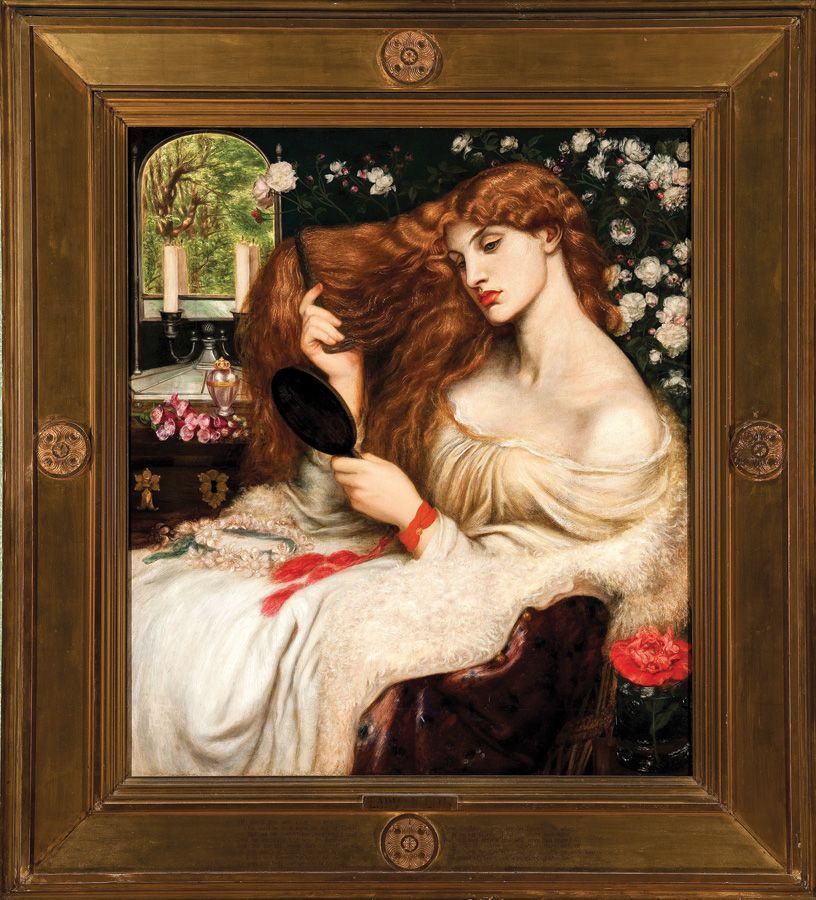
Dante Gabriel Rossetti, Lady Lilith, 18661868 Kunst, Künstler, Ausstellungen, Kunstgeschichte
Lady Lilith is an oil painting by Dante Gabriel Rossetti first painted in 1866-1868 using his mistress Fanny Cornforth as the model, then altered in 1872-73 to show the face of Alexa Wilding. [1] The subject is Lilith, who was, according to ancient Judaic myth, "the first wife of Adam " and is associated with the seduction of men and the.

Lady Lilith by Dante Gabriel Rossetti ART PRINT Etsy
Title: Lady Lilith. Artist: Dante Gabriel Rossetti (British, London 1828-1882 Birchington-on-Sea) Artist: Henry Treffry Dunn (British, Truro 1838-1899 London) Date: 1867. Medium: Watercolor and gouache (bodycolor) Dimensions: 20 3/16 X 17 5/16 in. (51.3 x 44 cm) Classification: Drawings. Credit Line: Rogers Fund, 1908.
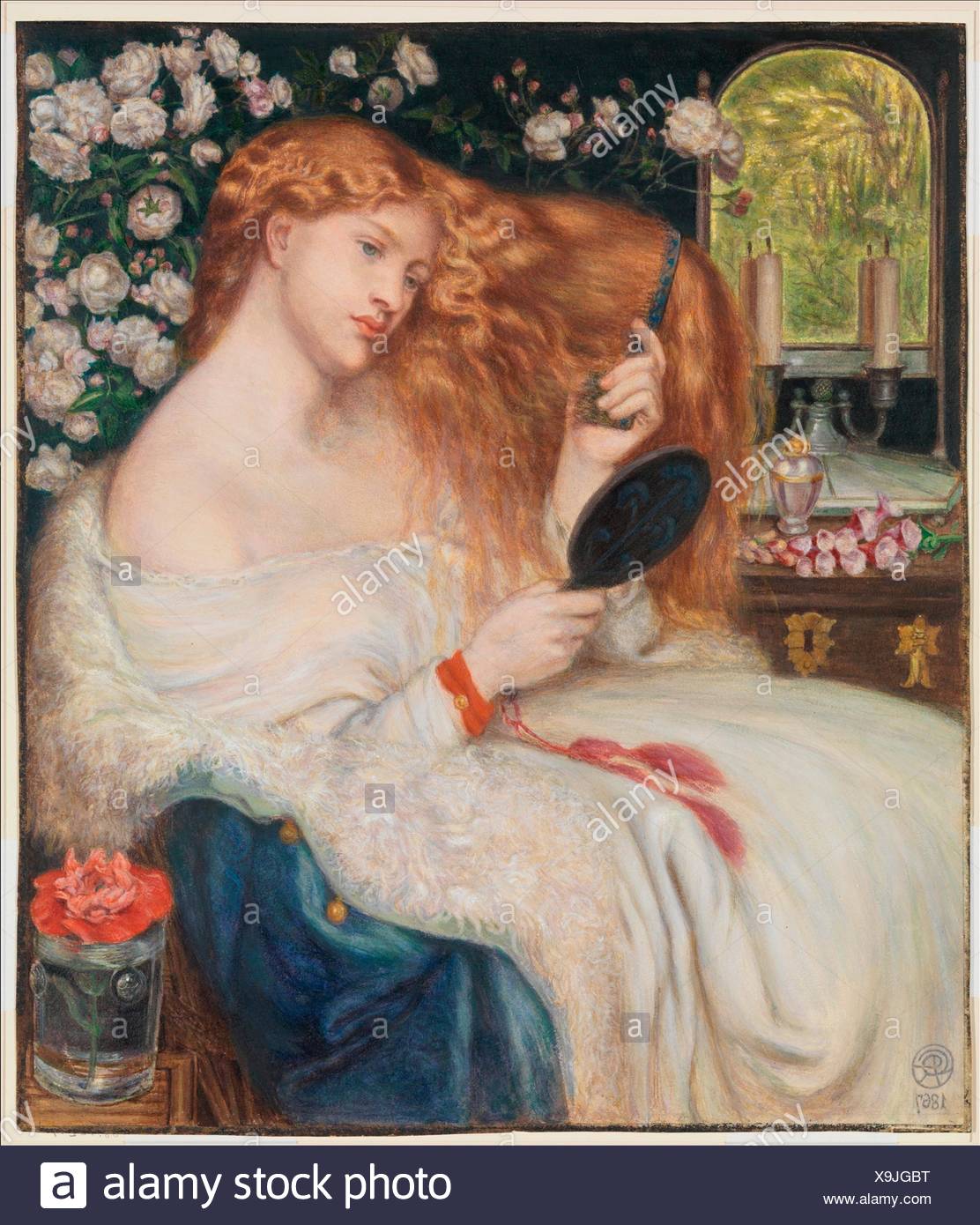
Lady Lilith Dante Gabriel Rossetti Prints Art & Collectibles
Dante Gabriel Rossetti created the poem Body's Beauty and the associated painting Lady Lilith in a time and place where women had a specific role in society. The 'ideal' nineteenth-century English woman was submissive to any male influence in her life, always proper, and well behaved. With this poem and painting, Rossetti presents an.

“Details of Lady Lilith, Dante Gabriel Rossetti, 18661868. ” Aesthetic art, Classical art
In Dante Gabriel Rossetti's Lady Lilith (Figure 1), a woman gazes at her own reflection in a small hand-mirror whilst combing her abundant mass of golden hair, her loose white dress slipping to reveal a suggestive curve of bare shoulder. This woman is Lilith, known in traditional Jewish lore
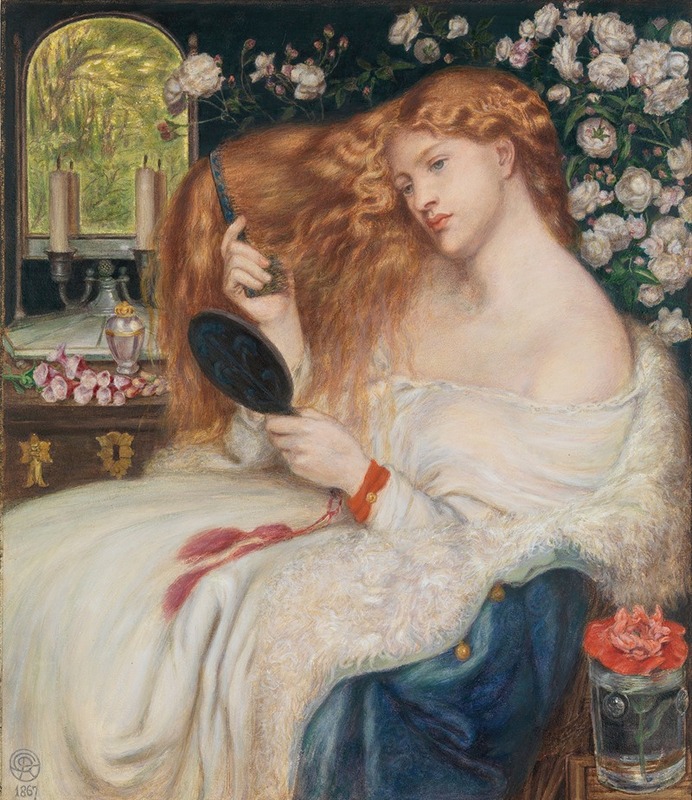
Lady Lilith by Dante Gabriel Rossetti Artvee
The painting is part of the double work that includes the companion sonnet Body's Beauty, which is the 1881 title of the work originally called "Lady Lilith" and then "Lilith" (in its 1868 and 1870 printings respectively). The double work should be compared with DGR's translation of a passage from Goethe ("Lilith—from Goethe") and.
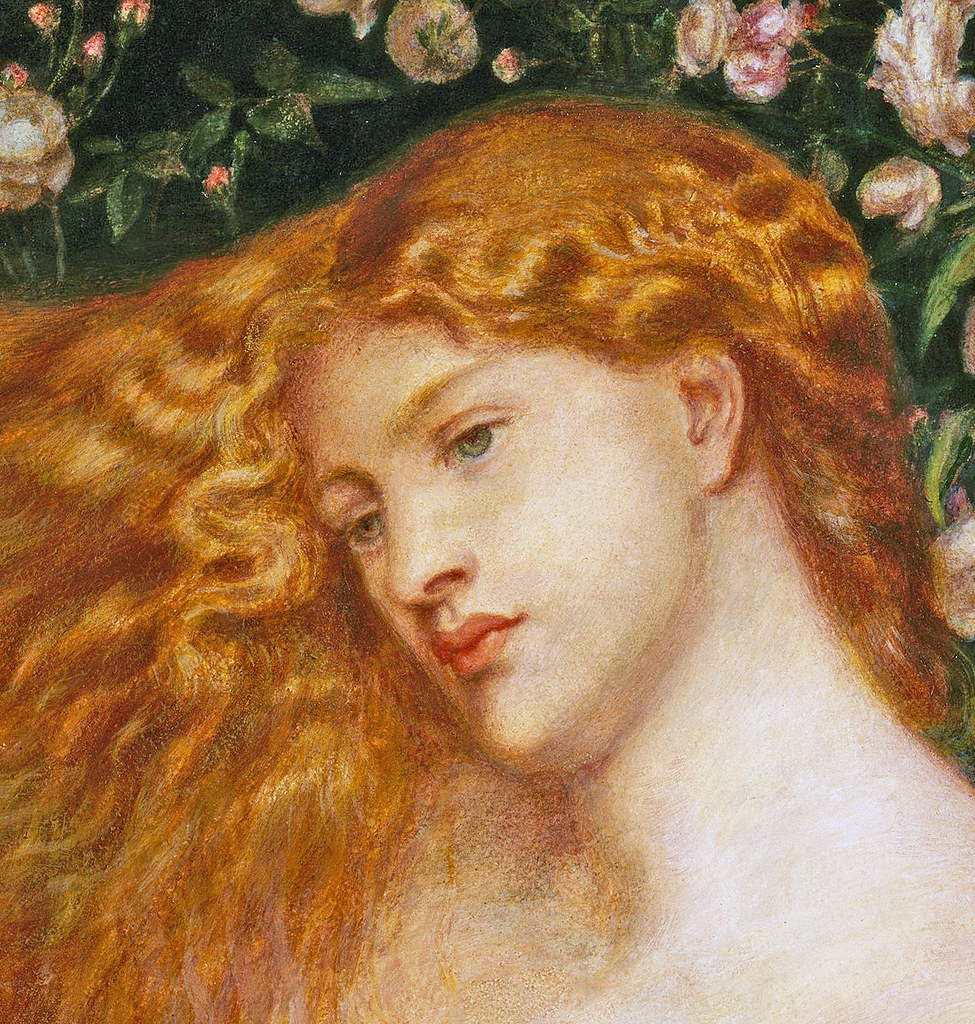
Dante Gabriel Rossetti Lady Lilith, detail [1867] Flickr
Lady Lilith. Dante Gabriel Rossetti, 1866 - 1873. 96.5 cm 85.1 cm. Lady Lilith is a Pre Raphaelite Oil on Canvas Painting created by Dante Gabriel Rossetti from 1866 to 1873. It lives at the Delaware Art Museum in the United States. The image is in the Public Domain, and tagged Women, Lilith, Beauty and Femme Fatales.
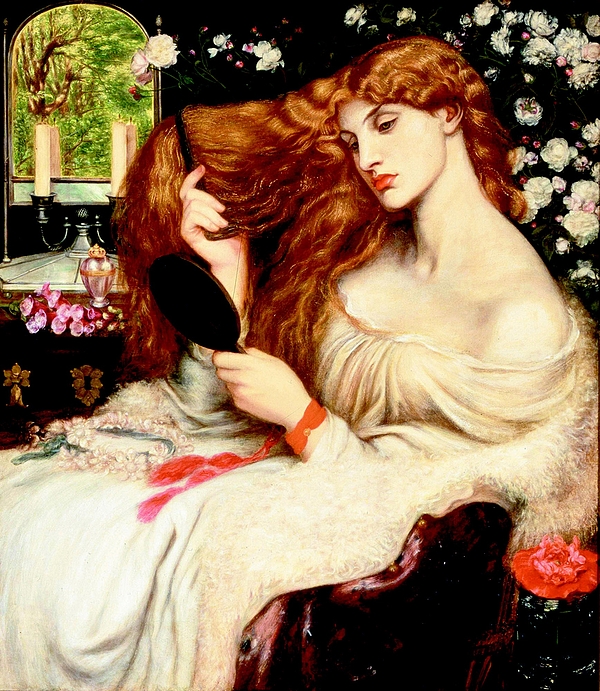
Lady Lilith Tapestry for Sale by Dante Gabriel Rossetti
In Rossetti's painting, Lady Lilith, the subject dominates the picture. It is to her striking features that the eye is drawn, thanks in part to the brilliance of her skin, which almost acts as a source of light. Her gaze is remarkable for its intensity. However, it is not focused outside at the viewer, nor at any object in the picture except.
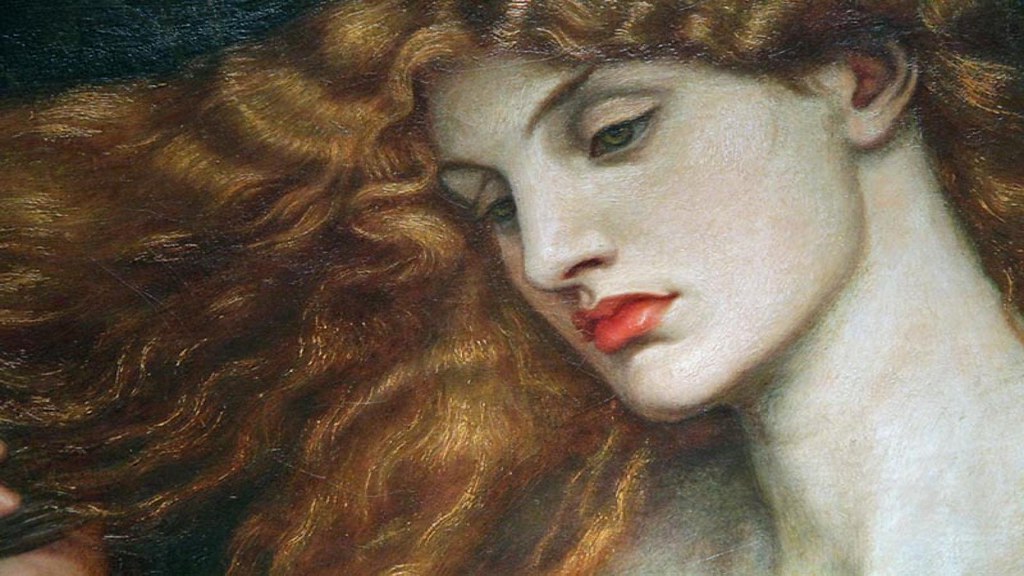
Lady Lilith by Dante Gabriel Rossetti (detail) Valeria V Flickr
Lady Lilith was intended to be paired with another of Rossetti's paintings, Sibylla Palmifera (1866-70). Wilding served as the model for this composition and it's possible that Rossetti.

Dante Gabriel Rossetti Lady Lilith, 19th century PICRYL Public Domain Search
In his Lady Lilith painted between 1868 and 1873, Dante Gabriel Rossetti depicts the themes of both feminine sexuality and feminine culpability in an especially striking and unusual manner. Here he chooses to emphasize the parallel between the contemporary idea of the highly sexual seductress to that of Christian mythology's first female.